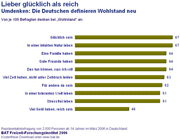Better happy than rich.
Rethinking: Germans are redefining prosperity
During the prosperous 1980s and 90s, the three pillars of consumption for young people were shopping, going to the movies, and eating out, while the rest of the population also dreamed of further increases in prosperity – from an expensive car to a dream trip around the world. Now, in times of Hartz IV (unemployment benefits), declining real incomes, and uncertain future prospects, Germans are rethinking their priorities: prosperity begins with feeling good. Germans would rather be happy (67%) than rich (46%). And even young people now associate prosperity more with "having a family" (65%) than with "money for a long dream vacation" (61%). This is according to a recent representative survey conducted by the BAT Leisure Research Institute, in which 2,000 people aged 14 and over across Germany were asked what prosperity means to them personally today.
„The purely material understanding of prosperity is fundamentally changing,“ says Prof. Dr. Horst W. Opaschowski, head of the institute. „When most Germans think of prosperity, they think more about social quality of life than simply increasing their standard of living. And that means: living in peace and without worries with family and friends. A new, yet familiar, sense of middle-class values is in demand again.“ Young people aged 14 to 19 even rate personal happiness higher (71%) than the rest of the population (67%).
Brave new world of citizens.
The Renaissance of the Family
In times of crisis or economic hardship, people have always tended to retreat to their own homes. A similar shift in values occurred after the last Gulf War in 1991, when a trend toward "cocooning" emerged, and consumers embraced saving and living more modestly ("small is beautiful"/"back to the simple life"). Therefore, it is not surprising that security and precautionary measures are now central to the population's priorities, and a secure income is valued more highly than wealth. Professor Opaschowski: "The family is—in a positive sense—inexpensive and compassionate. The family becomes a welfare organization that no life insurance policy can replace."„
For the population, prosperity has become a matter of social well-being. When professional security becomes uncertain and money is tight, people draw closer together and focus on what is stable. Those with a net household income below €1,500 are therefore more likely to equate "having a family" (67%) with prosperity than higher earners with an income above €3,500 (59%). A sense of interdependence is also spreading among young people: for them, prosperity and well-being include good friends (70% – total population: 64%) and family (65% – total population: 64%). Opaschowski: "New forms of internal solidarity are developing within circles of friends and family."„
New values of prosperity encompassing freedom, helpfulness, and tolerance
According to the population, a carefree life includes not only a peaceful world but also an "intact natural environment" (67%), which families (71%) value significantly more than singles (58%). Families primarily want to live in a tolerant world (64% – singles: 55%) and are also more willing to "be there for others" (68% – singles: 57%). Singles continue to prioritize material values ("lots of money") and also enjoy having plenty of time for themselves more.
„The increasing importance of intangible well-being, encompassing freedom, helpfulness, and tolerance, presents a new challenge for society and politics,“ says Professor Opaschowski. „Citizens must be empowered to take responsibility for their own subjective well-being.“ In the future, prosperity can also mean owning fewer possessions and yet living better. The formula for prosperity in Bertolt Brecht’s Threepenny Opera – „Only those who live in prosperity live comfortably“ – must be re-evaluated in the 21st century.



